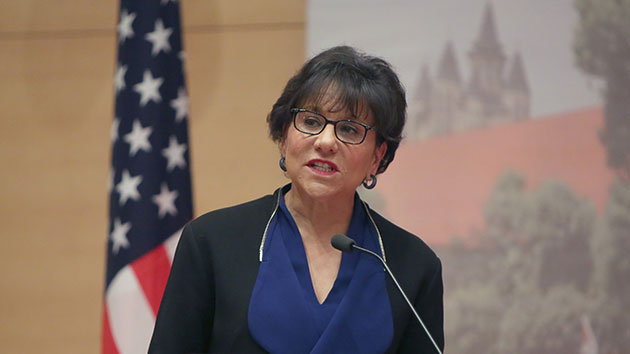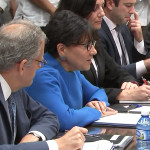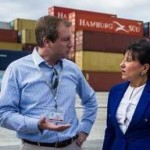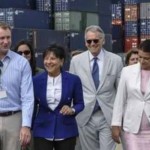
Secretary Pritzker: ‘Focus on the opportunities of today and tomorrow’
U.S. Secretary of Commerce Penny Pritzker and Cuban Minister of Foreign Trade and Foreign Investment Rodrigo Malmierca inaugurated the Regulatory Dialogue between U.S. and Cuban officials [in Havana on Wednesday, Oct. 7]. During this meeting, representatives from the Departments of Commerce, Treasury, and State [discussed] the recent changes to regulations, governing trade, financial transactions, and travel applicable to Cuba. U.S. officials [also heard] from Cuban counterparts on the structure and status of the Cuban economy. This Regulatory Dialogue is aimed to facilitate more effective implementation of new U.S. policies toward Cuba.
Following the inauguration of the dialogue, Secretary Pritzker met with Minister Malmierca.
Secretary Ptritzker’s remarks:
Thank you. I am honored to be here in Havana this morning for the inaugural U.S.-Cuba Regulatory Dialogue.
Last December, President Obama announced the most significant changes in United States policy toward Cuba in more than half a century. As Secretary Kerry said during his recent visit here, President Obama and President Castro “made the courageous decision to stop being prisoners of history and focus on the opportunities of today and tomorrow” by agreeing to begin normalizing relations between our countries. This week’s regulatory dialogue is about learning how to make those theoretical opportunities a reality.
This shift in policy is rooted in a fundamental desire to improve the lives of people in both of our nations. We want to help all Cubans plug into the global economy and enjoy a higher standard of living, while also giving the people of the United States an opportunity to learn about Cuba and develop relationships with the people of an island that is only 90 miles away from our shores.
To help us achieve these goals, we eliminated certain restrictions on remittances, eased limits on exports and imports – including trade in the telecommunications sector – and made changes to facilitate authorized travel to the island. We do not expect that these actions will have a transformational impact on the lives of the Cuban people overnight. And the extent of their impact will be dependent on the Cuban government also taking certain steps to update its regulatory system and reform the economy in ways that support the continued development of a Cuban private sector.
To that end, we urge President Castro and his government to make it easier for Cuban citizens to trade and travel more freely, to enjoy the fruits of their labor, to access the Internet, and to be hired directly by foreign companies. If, over time, we continue taking the necessary steps, we can build a more open relationship between our nations, and the Cuban people can achieve greater prosperity.
In order to implement President Obama’s new approach, the Commerce and Treasury Departments have revised a series of regulations that govern the activities of U.S. persons and U.S. businesses with respect to Cuba. There are a number of activities that simply no longer require U.S. government approvals. For example, a trade delegation no longer needs to apply to the federal government for permission to travel to Cuba, and U.S. companies can export equipment to private agricultural cooperatives in Cuba without prior federal approval. We also announced new telecommunications-related authorizations to increase the connectivity and productivity of the Cuban people, as well as travel-related changes that will enable more Americans to visit the island.
In other key areas, like safety of civil aviation, we are reviewing applications on a case-by-case basis, but we have revised our licensing policies to facilitate greater exports. This will, among other things, facilitate the establishment of regular commercial flights between the U.S. and Cuba. Nevertheless, the U.S. embargo – which only our Congress can overturn – limits what the President can do in changing our approach.
Let me be clear: our Administration strongly supports lifting the embargo, and we hope Congress takes action to repeal it in the near future. In the meantime, we continue to support greater economic opportunity for the Cuban people. Today’s dialogue provides us with a desired opportunity to learn from each other.
Our team is here to answer specific questions about the regulatory changes that the United States has made in recent months and to share some of the feedback and observations we have heard from U.S. companies about the challenges and opportunities for doing business in Cuba. My delegation includes senior regulatory experts from the Commerce Department’s Bureau of Industry and Security; the Treasury Department’s Office of Foreign Assets Control; and officials from the Department of State – all of whom will talk in depth about the revised regulations.
But to be good partners, we also need to hear from your side. Frankly, we need to understand how the Cuban economy works in order for U.S. and Cuban companies to capitalize on the opportunities created by our regulatory changes.
For example, U.S. companies and individuals need to understand how exports are handled once they arrive in Cuba to determine whether a potential recipient of an export is an eligible recipient for that product. Specifically, we want to know: how the import, export, and distribution of goods works in Cuba, what types of cooperatives and other businesses exist; and, how self-employed persons obtain goods to run their businesses. Helping us understand the answers to these questions will enable us to more effectively implement revisions to our system – which, in turn, will ensure our policy changes deliver the maximum benefit to the Cuban people.
President Obama and President Castro have asked all of us to start writing a new chapter in the history of the U.S.-Cuba relationship. Our fundamental goal is to build working relationships that will create more opportunities for the people of both Cuba and the United States. It is my hope that this week is the first in a series of meetings where we help each other understand our systems.
Through these dialogues, we will build trust and lay the groundwork for constructive engagement now and in the future. I look forward to working with all of you to seize this historic opportunity.
Thank you.





